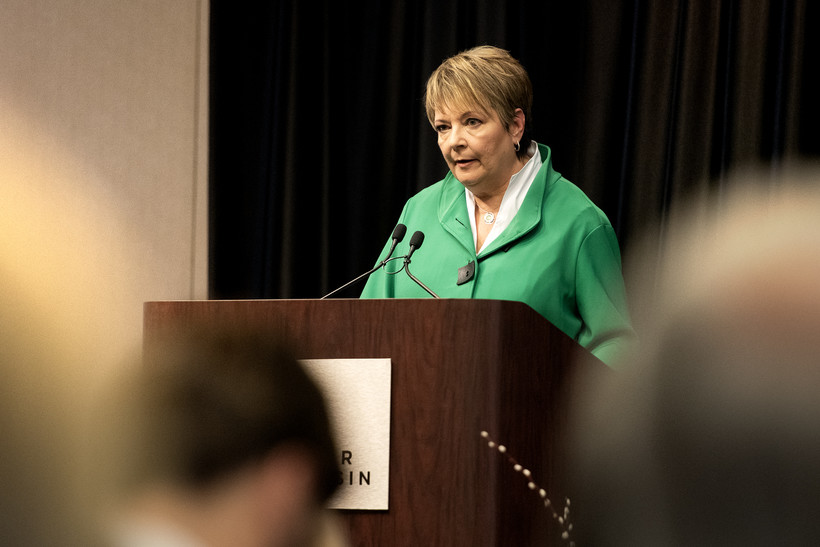New Act 10 Lawsuit Puts Renewed Focus On Protasiewicz
New Supreme Court judge previously said she disagreed with prior rulings on 2011 law.

Judge Janet Protasiewicz answers a question during a debate with opponent Justice Dan Kelly on Tuesday, March 21, 2023, at the State Bar Center in Madison, Wis. Angela Major/WPR
The latest legal challenge to one of the state’s highest-profile laws is putting a renewed focus on the Wisconsin Supreme Court‘s newest justice and comments she made as a candidate earlier this year.
Several unions filed a lawsuit last week challenging the constitutionality of Act 10, the signature policy of former Republican Gov. Scott Walker. The law ended collective bargaining for most public employees in Wisconsin.
The state Supreme Court upheld the law nearly a decade ago when it was led by conservative justices. But with the election of Justice Janet Protasiewicz earlier this year, and the shift to a liberal majority, the outcome could be different this time.
Act 10 ended collective bargaining for most public unions by allowing them to bargain solely over base wage increases no greater than inflation. It also disallowed the automatic withdrawal of union dues and required annual recertification votes for unions.
During her campaign, Protasiewicz said she disagreed with the court’s prior decision.
“I agree with the dissent in that case, where the authors said Act 10 is unconstitutional,” she said at an event in Madison.
Protasiewicz later told the Milwaukee Journal Sentinel that she might consider recusing herself from the case because she marched against the plan when it was in the Legislature and signed the petition to recall Walker over the law.
Decision to recuse rests with Protasiewicz but may hinge on how other justices would vote
Howard Schweber, a professor emeritus of political science at the University of Wisconsin-Madison, said Protasiewicz may view her participation in this case differently from another about the state’s legislative maps.
Protasiewicz called the maps “rigged” during the campaign, but has rejected GOP calls to recuse herself from redistricting cases.
The court has many different options for whether or how they would draw new legislative maps, Schweber said. But a challenge to Act 10 is much more black and white.
“I think she’s concerned about the fact that she’s much more exposed in terms of having taken a specific position on a legal question as an issue in this case,” he said. “After all, there aren’t lots of different ways of working this one out.”
The decision to recuse may come down to whether Protasiewicz would determine the result, Schweber said. If she’s concerned about appearances, he said she might remain on the case and vote against the challenge.
Schweber said the hardest decision for Protasiewicz would be if she wanted the law overturned, but the court would be deadlocked if she were to recuse. A three-three split among the remaining justices would mean the law would survive.
“I think certainly if I were her, I’d wanna try and take the temperature of my fellow justices and see if my presence or absence was likely to make a difference in the outcome at all,” he said.
Walker, others weigh in
Walker, who rose to national prominence following his introduction of the collective bargaining plan, defended Act 10 in recent media appearances. He said Protasiewicz should recuse herself from the case.
“Her putting politics ahead of her judicial responsibility, I think, is a big, big concern,” Walker told Madison television station WKOW. “I don’t think we have any luck with her. I do think someone like (Justice) Ann Walsh Bradley who’s been on the court nearly a quarter of a century will look at past precedent.”
Bradley, another of the court’s liberal justices, wrote the dissent to the Act 10 decision in 2014, where she argued law is unconstitutional. Bradley is up for re-election in 2025 in a race that could again decide the court’s ideological balance.
Patrick Guarasci, who ran Protasiewicz’s campaign, told WISN-TV that the court may not decide all of its high-profile cases before that 2025 election.
“Some of that stuff has to work its way through lower courts. I think this court is not trying to legislate from the bench,” he said. “We haven’t seen what will happen on the maps case. We haven’t seen what will happen on abortion when it gets to the court.”
Listen to the WPR report here.
Act 10 lawsuit renews focus on Protasiewicz was originally published by Wisconsin Public Radio.
More about the ACT 10
- Susan Crawford Attempted to Overturn Act 10 - Brad Schimel - Feb 26th, 2025
- Despite Act 10, Union Argues UW Health Nurses Can Collectively Bargain - Rich Kremer - Feb 13th, 2025
- Protasiewicz Says She Won’t Recuse From Act 10 Case - Anya van Wagtendonk - Feb 13th, 2025
- Unions: We Remain Confident in Merits of Our Case - Wisconsin Education Association Council - Feb 12th, 2025
- Supreme Court Justice Brian Hagedorn Recuses Himself From Act 10 Challenge - Rich Kremer - Jan 31st, 2025
- Republicans Push Justice Protasiewicz to Recuse From Act 10 Case - Anya van Wagtendonk - Jan 29th, 2025
- Ruling That Struck Down Act 10 Put on Hold - Rich Kremer - Dec 20th, 2024
- Data Wonk: Did Act 10 Improve Wisconsin’s Economy? - Bruce Thompson - Dec 12th, 2024
- Op Ed: Republicans Behind the Times on Act 10 - Ruth Conniff - Dec 11th, 2024
- Murphy’s Law: Act 10 Ruling Could Be Tough to Overturn - Bruce Murphy - Dec 9th, 2024
Read more about ACT 10 here






















I don’t have an opinion on Act 10. Though I think there would be less bullying of teachers by municipalities with it.
I am deflecting next.
I would like a retrial on the campaign finance laws in WI. Half those Judges received funds from the criminals and did not recuse.